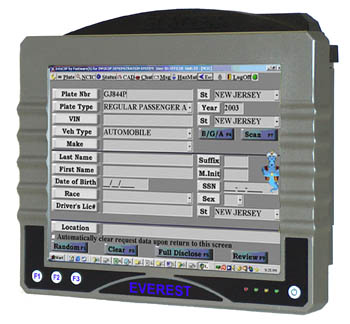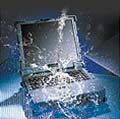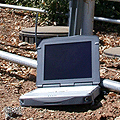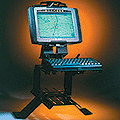|
Glacier Computer Everest
Rugged compact slate for fixed-mount applications
(by Conrad H. Blickenstorfer)
Glacier Computer is an Amherst, New Hampshire based designer, developer, and supplier of rugged industrial computers. Their Everest series of harsh environment computers was conceived primarily for forklift and fixed-mount applications in warehousing and manufacturing where they may encounter extreme conditions and the need for 24/7 operation.

The Everest, like the Magnum, is a fairly compact all-in-one, fanless, industrial computer that's quite obviously optimized for uses were qualities such as toughness and sealing out the elements for reliable performance are tantamount. Without the vents and fans commercial units use to get rid of the excessive heat of the latest hot-running CPUs, Glacier uses a range of processors that run cool yet can do the job, from a 600 MHz Intel Celeron up to a 1.4 GHz Pentium M.
The Everest is available with a variety of display options as well. Customers have a choice of either a 10.4" or a 12.1" SVGA screen, with a daylight-readable LCD optionally available as well as a 5-wire touchscreen. Those who need to operate the machine at the low end of its -22 to 132 degree Fahrenheit temperature range can order an optional touchscreen heater. Memory goes up to a gigabyte of DDR SDRAM, disks are 40GB or more, and you can also order the Everest with a solid state FLASH drive of up to 8GB. This flexibility continues on the software side where Glacier can load the machines with Linux, Windows XP Pro, Windows XP Embedded, or, according to Glacier, even Windows Vista.
In order to facilitate maximum uptime, the Everest has a custom onboard diagnostic and configuration utility. The utility provides IT personnel with "flight recorder"-like data, as well as real time access to key statistics such as processor temperature, reboots, etc. There are also function buttons so frequently used tools can be accessed quickly without needlessly pounding the touchscreen.
Since most Everests will be mounted, they come with a 6V to 60V isolated internal power supply, thus eliminating the need for external power converters or filters when used on forklifts and in other vehicles. The device also has an internal UPS with SmartBattery technology that's good for one hour of operation. Interfaces include both legacy serial and PS/2 ports as well as USB 2.0. The PS/2 and USB ports are locking so that things don't get disconnected while on the job. Since many users run terminal emulation or HTML applications over their intranet, the Everest can be ordered with 802.11a/b/g wireless LAN. WAN, Bluetooth and GPS are available also.
On the ruggedness spec side, the Everest series, which is assembled in New Hampshire, is HALT (Highly-Accelerated Life Testing) tested, must pass thermal and reliability testing and has a mean time between failure of nearly 40,000 hours. They are built to Mil-Spec standards, have an IP65 ingress protection rating and are practically indestructible. HALT testing, by the way, employs the use of temperature, vibration, humidity, over-voltage and other stress conditions during product development to locate weak spots in the design and anticipated fabrication processes. The idea is to expose potential defects so they never even make it into production units -- certainly a comforting thought. |











